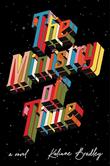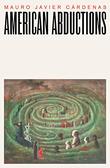
by David Small ; illustrated by David Small ‧ RELEASE DATE: March 12, 2024
Surreal and searing.
The latest from writer-artist Small is a triptych of short illustrated stories (two adaptations and one original) that explore the idea of lurking monsters.
In the first, adapted from Lincoln Michel’s short story “The Werewolf at Dusk,” an aging lycanthrope laments his lost vitality: The years have rendered his once-fearsome lupine form mangy, stooped, and medicated. The Small original, “A Walk in the Old City,” follows a psychotherapist lost and imperiled on strange, circuitous streets who recognizes his surroundings as nothing more than a dream but then must confront the identity of the dreamer—and a pack of dog-sized spiders. The final tale is based on Jean Ferry’s “Le Tigre Mondain,” in which a theatergoer in 1920s Berlin has his night of frivolity ruined by the surprise performance of a popular farce featuring a tiger behaving like a man, from wearing a suit to not eating a baby, with the salivating beast held in check only by the will of the nearby and increasingly exhausted Adolf Hitler. The collection is more adult picture book than graphic novel and is immensely enjoyable. Small’s linework is striking in its expressiveness and energy, figures and forms leaping across the page while eyes and lips simmer with emotion. Broad patches and layers of color imbue the illustrations with a gorgeous painterly quality. An introduction from Smalls connects the three stories thematically and challenges the reader to not fall victim to that most insidious of monsters lurking within so many of us: passivity. From the unceasing and enervating march of time to the uncertainty of our agency to the crass manipulation of the masses by the elite, Small convincingly makes the case that we are beset on all sides (especially inside) by monsters.
Surreal and searing.Pub Date: March 12, 2024
ISBN: 9781324092827
Page Count: 160
Publisher: Liveright/Norton
Review Posted Online: Dec. 6, 2023
Kirkus Reviews Issue: Jan. 1, 2024
Share your opinion of this book
More by David Small
BOOK REVIEW
by David Small & illustrated by David Small
BOOK REVIEW
by David Small & illustrated by David Small
BOOK REVIEW
by David Small

by Percival Everett ‧ RELEASE DATE: March 19, 2024
One of the noblest characters in American literature gets a novel worthy of him.
Mark Twain's Adventures of Huckleberry Finn as told from the perspective of a more resourceful and contemplative Jim than the one you remember.
This isn’t the first novel to reimagine Twain’s 1885 masterpiece, but the audacious and prolific Everett dives into the very heart of Twain’s epochal odyssey, shifting the central viewpoint from that of the unschooled, often credulous, but basically good-hearted Huck to the more enigmatic and heroic Jim, the Black slave with whom the boy escapes via raft on the Mississippi River. As in the original, the threat of Jim’s being sold “down the river” and separated from his wife and daughter compels him to run away while figuring out what to do next. He's soon joined by Huck, who has faked his own death to get away from an abusive father, ramping up Jim’s panic. “Huck was supposedly murdered and I’d just run away,” Jim thinks. “Who did I think they would suspect of the heinous crime?” That Jim can, as he puts it, “[do] the math” on his predicament suggests how different Everett’s version is from Twain’s. First and foremost, there's the matter of the Black dialect Twain used to depict the speech of Jim and other Black characters—which, for many contemporary readers, hinders their enjoyment of his novel. In Everett’s telling, the dialect is a put-on, a manner of concealment, and a tactic for survival. “White folks expect us to sound a certain way and it can only help if we don’t disappoint them,” Jim explains. He also discloses that, in violation of custom and law, he learned to read the books in Judge Thatcher’s library, including Voltaire and John Locke, both of whom, in dreams and delirium, Jim finds himself debating about human rights and his own humanity. With and without Huck, Jim undergoes dangerous tribulations and hairbreadth escapes in an antebellum wilderness that’s much grimmer and bloodier than Twain’s. There’s also a revelation toward the end that, however stunning to devoted readers of the original, makes perfect sense.
One of the noblest characters in American literature gets a novel worthy of him.Pub Date: March 19, 2024
ISBN: 9780385550369
Page Count: 320
Publisher: Doubleday
Review Posted Online: Dec. 16, 2023
Kirkus Reviews Issue: Jan. 15, 2024
Share your opinion of this book
More About This Book
PERSPECTIVES
PERSPECTIVES

by Barbara Kingsolver ‧ RELEASE DATE: Oct. 18, 2022
An angry, powerful book seething with love and outrage for a community too often stereotyped or ignored.
Awards & Accolades
Likes

52
Our Verdict

GET IT
Kirkus Reviews'
Best Books Of 2022
New York Times Bestseller
Pulitzer Prize Winner
Inspired by David Copperfield, Kingsolver crafts a 21st-century coming-of-age story set in America’s hard-pressed rural South.
It’s not necessary to have read Dickens’ famous novel to appreciate Kingsolver’s absorbing tale, but those who have will savor the tough-minded changes she rings on his Victorian sentimentality while affirming his stinging critique of a heartless society. Our soon-to-be orphaned narrator’s mother is a substance-abusing teenage single mom who checks out via OD on his 11th birthday, and Demon’s cynical, wised-up voice is light-years removed from David Copperfield’s earnest tone. Yet readers also see the yearning for love and wells of compassion hidden beneath his self-protective exterior. Like pretty much everyone else in Lee County, Virginia, hollowed out economically by the coal and tobacco industries, he sees himself as someone with no prospects and little worth. One of Kingsolver’s major themes, hit a little too insistently, is the contempt felt by participants in the modern capitalist economy for those rooted in older ways of life. More nuanced and emotionally engaging is Demon’s fierce attachment to his home ground, a place where he is known and supported, tested to the breaking point as the opiate epidemic engulfs it. Kingsolver’s ferocious indictment of the pharmaceutical industry, angrily stated by a local girl who has become a nurse, is in the best Dickensian tradition, and Demon gives a harrowing account of his descent into addiction with his beloved Dori (as naïve as Dickens’ Dora in her own screwed-up way). Does knowledge offer a way out of this sinkhole? A committed teacher tries to enlighten Demon’s seventh grade class about how the resource-rich countryside was pillaged and abandoned, but Kingsolver doesn’t air-brush his students’ dismissal of this history or the prejudice encountered by this African American outsider and his White wife. She is an art teacher who guides Demon toward self-expression, just as his friend Tommy provokes his dawning understanding of how their world has been shaped by outside forces and what he might be able to do about it.
An angry, powerful book seething with love and outrage for a community too often stereotyped or ignored.Pub Date: Oct. 18, 2022
ISBN: 978-0-06-325-1922
Page Count: 560
Publisher: Harper/HarperCollins
Review Posted Online: July 13, 2022
Kirkus Reviews Issue: Aug. 1, 2022
Share your opinion of this book
More by Barbara Kingsolver
BOOK REVIEW
BOOK REVIEW
BOOK REVIEW
More About This Book
SEEN & HEARD
PERSPECTIVES
SEEN & HEARD
© Copyright 2024 Kirkus Media LLC. All Rights Reserved.
Hey there, book lover.
We’re glad you found a book that interests you!
We can’t wait for you to join Kirkus!
It’s free and takes less than 10 seconds!
Already have an account? Log in.
OR
Trouble signing in? Retrieve credentials.
Welcome Back!
OR
Trouble signing in? Retrieve credentials.
Don’t fret. We’ll find you.





